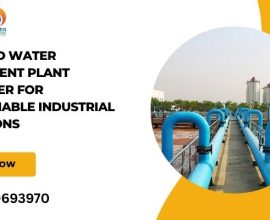
Water is the lifeblood of every manufacturing unit from steel and textile to food and pharmaceuticals. But when untreated or poorly managed, it can quietly sabotage efficiency, corrode machinery, and even violate environmental regulations. So, what makes industrial water treatment such a game-changer for Kolkata’s fast-growing industries? Let’s explore how the right technology is shaping smarter, cleaner, and more sustainable production processes.
Why Industrial Water Treatment Matters More Than Ever?
Kolkata, known for its thriving manufacturing and processing units, is also witnessing a rising demand for efficient water treatment systems. Industrial water often carries dissolved solids, heavy metals, oil residues, and biological contaminants all of which can disrupt production or damage equipment. That’s where a reliable water treatment plant supplier in kolkata comes in, ensuring that water quality meets both operational and environmental standards.
According to data from the U.S. Environmental Protection Agency (EPA), effective water treatment can reduce industrial waste discharge by over 60%, while cutting down operational costs related to equipment corrosion and scaling. For Kolkata’s industries that rely heavily on continuous water circulation, that translates to substantial savings and improved longevity of systems.
Key Industrial Water Treatment Solutions Used in Kolkata
Modern manufacturing units now blend traditional purification methods with advanced automation. Let’s break down the most widely used solutions that are reshaping Kolkata’s industrial landscape.
1. Reverse Osmosis (RO) Systems
Reverse Osmosis has become a cornerstone for industries seeking high-purity water. RO systems use semi-permeable membranes to remove dissolved salts and impurities, ensuring consistent water quality for sensitive production lines especially in food, electronics, and pharmaceuticals.
2. Effluent Treatment Plants (ETP)
Effluent Treatment Plants are crucial for industries producing wastewater containing oils, chemicals, or dyes. These systems ensure compliance with environmental norms set by the Central Pollution Control Board (CPCB) and help industries recycle and reuse water efficiently.
3. Sewage Treatment Plants (STP)
Industrial complexes with residential or office facilities benefit from STPs that treat domestic wastewater for reuse in gardening, flushing, or cooling systems promoting circular water economy models that reduce freshwater dependency.
4. Demineralization (DM) and Softening Plants
DM and softening units are vital for preventing scale buildup in boilers and cooling towers. They help maintain heat transfer efficiency, reduce maintenance downtime, and extend equipment life an absolute must for manufacturing lines running 24/7.
Choosing the Right Technology Partner in Kolkata
The difference between an average and an exceptional system often lies in engineering expertise and local experience. Reputed firms like the best water treatment plant manufacturers offer tailored systems suited to Kolkata’s water composition and industrial load requirements. When selecting a partner, consider:
- Customization: Whether your plant needs high-capacity RO or compact ETP modules.
- Automation & Monitoring: Smart sensors and IoT integration allow real-time performance tracking.
- Compliance Support: Systems should meet state PCB and environmental norms without frequent intervention.
- After-Sales Support: Local servicing ensures quick response and minimal downtime.
Emerging Trends in Industrial Water Management
Kolkata’s industries are now adopting a more circular approach recycling and reusing water instead of relying solely on municipal supply. A few emerging innovations include:
- Zero Liquid Discharge (ZLD) Systems: Advanced technologies that ensure no wastewater leaves the facility.
- Membrane Bioreactor (MBR) Technology: Combining biological treatment with membrane filtration for higher efficiency.
- AI-Based Monitoring: Predictive analytics that forecast system failures and optimize chemical dosing.
These systems are not just about compliance; they’re about future-proofing Kolkata’s manufacturing sector against water scarcity and regulatory tightening. Smart water management is, quite literally, smart business.
Frequently Asked Questions (FAQ)
1. What is the most common water treatment method used in industries?
Reverse Osmosis (RO) and Effluent Treatment Plants (ETPs) are the most common, depending on the industry type and water quality requirements.
2. How often should industrial water treatment systems be maintained?
Ideally, systems should be inspected monthly and serviced quarterly. Regular preventive maintenance helps avoid costly breakdowns.
3. Are water recycling systems cost-effective for small manufacturing units?
Yes, modern modular systems are now designed for small-scale industries, offering quick ROI through water reuse and reduced disposal costs.
4. What regulations apply to industrial wastewater discharge in Kolkata?
Industries must comply with standards set by the Central Pollution Control Board (CPCB) and West Bengal Pollution Control Board (WBPCB) for effluent discharge and water reuse.
Final Thoughts
As Kolkata continues its industrial expansion, investing in advanced water treatment solutions isn’t just an environmental decision it’s a business imperative. From improved process efficiency to long-term sustainability, the right technology can redefine operational excellence. Partnering with an experienced industrial water treatment expert ensures that your facility stays compliant, efficient, and future-ready.



